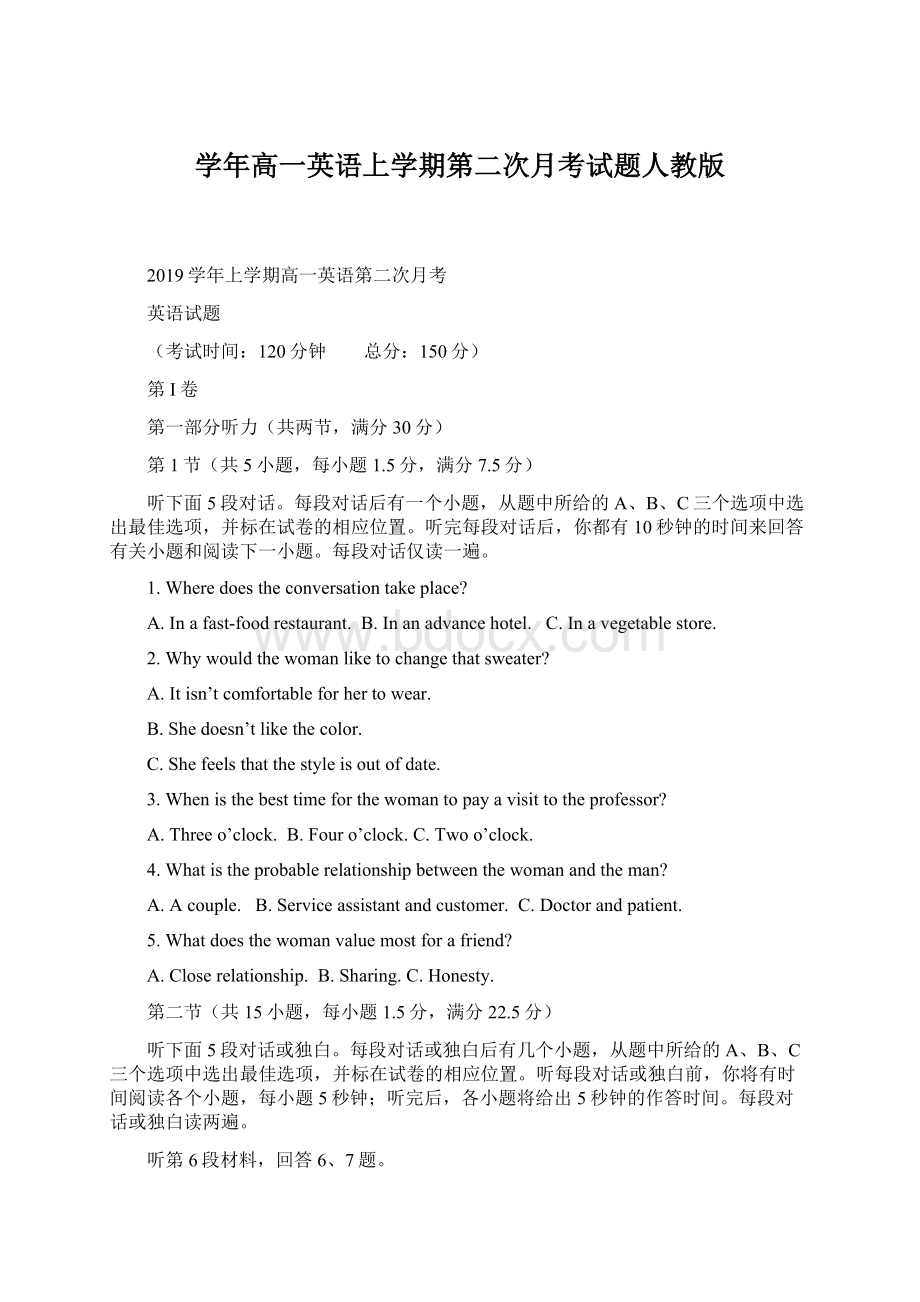学年高一英语上学期第二次月考试题人教版.docx
《学年高一英语上学期第二次月考试题人教版.docx》由会员分享,可在线阅读,更多相关《学年高一英语上学期第二次月考试题人教版.docx(11页珍藏版)》请在冰豆网上搜索。

学年高一英语上学期第二次月考试题人教版
2019学年上学期高一英语第二次月考
英语试题
(考试时间:
120分钟 总分:
150分)
第I卷
第一部分听力(共两节,满分30分)
第1节(共5小题,每小题1.5分,满分7.5分)
听下面5段对话。
每段对话后有一个小题,从题中所给的A、B、C三个选项中选出最佳选项,并标在试卷的相应位置。
听完每段对话后,你都有10秒钟的时间来回答有关小题和阅读下一小题。
每段对话仅读一遍。
1.Wheredoestheconversationtakeplace?
A.Inafast-foodrestaurant.B.Inanadvancehotel.C.Inavegetablestore.
2.Whywouldthewomanliketochangethatsweater?
A.Itisn’tcomfortableforhertowear.
B.Shedoesn’tlikethecolor.
C.Shefeelsthatthestyleisoutofdate.
3.Whenisthebesttimeforthewomantopayavisittotheprofessor?
A.Threeo’clock.B.Fouro’clock.C.Twoo’clock.
4.Whatistheprobablerelationshipbetweenthewomanandtheman?
A.Acouple.B.Serviceassistantandcustomer.C.Doctorandpatient.
5.Whatdoesthewomanvaluemostforafriend?
A.Closerelationship.B.Sharing.C.Honesty.
第二节(共15小题,每小题1.5分,满分22.5分)
听下面5段对话或独白。
每段对话或独白后有几个小题,从题中所给的A、B、C三个选项中选出最佳选项,并标在试卷的相应位置。
听每段对话或独白前,你将有时间阅读各个小题,每小题5秒钟;听完后,各小题将给出5秒钟的作答时间。
每段对话或独白读两遍。
听第6段材料,回答6、7题。
6.What’stherelationshipbetweenthetwospeakers?
A.Salesclerkandcustomer.B.Husbandandwife.C.Secretaryandboss.
7.Whatkindofclothesdoesthemanneedtobuy?
A.Thepriceis$280withalightcolor.
B.Thesizeis41withadarkercolor.
C.Thepriceisreasonable.
听第7段材料,回答第8、9题。
8.Wheredoestheconversationprobablytakeplace?
A.Inasupermarket.B.Inapostoffice.C.Inanairport.
9.HowlongwillittaketoAustraliabysurfacemail?
A.About14days.B.About9days.C.Aboutaweek.
听第8段材料,回答第10至12题。
10.Whatdoesthewomanpersuadethemantobuytoday?
A.Flowers.B.Jewellery.C.Dresses.
11.Howmuchwillthemanpayforthepearlnecklaceifhewantstobuyitatpresent?
A.880yuan.B.176yuan.C.704yuan.
12.Whatpromisedoesthewomanmake?
A.Quality.B.Color.C.Size.
听第9段材料,回答第13至16题。
13.Whydoesthemanmakeuphismindtoselectaneveningcourse?
A.Hehasgottoworkduringtheday.
B.Itistoodarktoattendadaytimecourse.
C.Aneveningcourseisabitcheaper.
14.Whatcoursemustbetakenbeforetakingcomputerprogramminginthewoman’sopinion?
A.Computerprogrammingcourse.B.Dataprocessing.C.Computerknowledge.
15.What’sthescheduleoftheeveningcourse?
A.EveryMonday,lastingfor12weeks.
B.Thursdayevening,from7:
00to9:
45.
C.Threehoursaweek,45hoursintotal.
16.Whatdoesthemanneedtobringwhenhegoestoregister(登记)?
A.Hisphoto.B.Identitycard.C.Checkbook.
听第10段材料,回答第17至20题
17.Howlonghadthefiremenbeenfightingtheforestfire?
A.Overonemonth.B.Almost21days.C.Aboutayear.
18.Whydidthegrass-seedhavetobeplantedquickly?
A.Topreventflooding.B.Tosavethetrees.C.Tostoptheheavyrain.
19.Whenwasthespecialseedorderedbytheforestauthority?
A.Duringthefire.B.Afterthefire.C.Beforethefire.
20.Howweretheseedsplanted?
A.Byhand.B.Byplane.C.Bytheheavyrain.
第二部分阅读理解(共两节,满分40分)
第一节(共15小题;每小题2分,满分30分)阅读下列短文,从每题所给的四个选项(A、B、C和D)中,选出最佳选项,并在答题纸上将该选项标号涂黑。
A
Sure,It'sgoodtogetalongwellwithyourteacherbecauseitmakesthetimeyouspendintheclassroommorepleasant.
Andyes,it'sgoodtogetalongwellwithyourteacherbecause,ingeneral,it'ssmarttolearnhowtogetalongwellwiththedifferenttypesofpeopleyou'llmeetthroughoutyourlife.
Infact,kidswhogetalongwellwiththeirteachersnotonlylearnmore,butthey'remorecomfortablewithaskingquestionsandgettingextrahelp.Thismakesiteasierforthemtounderstandnewmaterialsandmakesthemdotheirbestontests.Whenyouhavethiskindofrelationshipwithateacher,heorshecanbesomeonetoturntowithproblems,suchasproblemswithlearningorschoolissues(问题).
Hereisaquestion:
whatifyoudon'tgetalongwithyourteachers?
Infact,teacherswanttogetalongwellwithyouandenjoyseeingyoulearn.Butteachersandstudentssometimeshavepersonalityclashes(个性冲突),whichcanhappenbetweenanytwopeople.Ifyoushowyourteacherthatyouwanttomakethesituationbetter,heorshewillprobablydoeverythingpossibletomakethathappen.Bydealingwithaproblemlikethis,youlearnsomethingabouthowtogetalongwithpeoplewhoaredifferentfromyou.
Howeverifacertainteacherisn'tyourfavorite,youcanstillhaveasuccessfulrelationshipwithherorhimespecially________.Herearesomeofthoseresponsibilities(责任):
Attendclassreadytolearn.
Bepreparedforclasswiththerightstationery,books,andcompletedassignments(作业).
Listenwhenyourteacheristalking.
Doyourbest,whetherit'saclassroomassignment,homework,oratest.
21.Accordingtothepassage,gettingalongwellwithyourteacherswillmakeyou________.
A.havenoproblemswithstudy
B.getabetterseatintheclassroom
C.getthebestscoresintheexams
D.havemorepleasanttimeintheclassroom
22.Theunderlinedword“that”inthefourthparagraph,refersto________.
A.thehappytimeyouhaveintheclassroom
B.gettingalongverywellwithclassmates
C.abetterrelationshipbetweenyouandyourteacher
D.thedisappearanceofpersonalitydifferences
23.Whichofthefollowingcanbefilledintheblank?
A.ifyoufulfill(履行)yourbasicresponsibilitiesasastudent
B.ifyouarethoughtofasagoodstudent
C.ifyouknowsomebasicsocialskills
D.ifyouareeasygoingandhelpful
24.Whatdoesthepassagemainlytalkabout?
A.Theimportanceoffriendshipinschools.
B.Theimportanceofagoodrelationshipwithyourteachers.
C.Studyingskillsforstudents.
D.Usefulskillstogetalongwellwithyourteachers.
B
HowtosayhelloinJapanesedependsonwhenyousayit.ThisisverymuchlikedifferentgreetingsusedinEnglishatdifferenttimesofthedayornight.InJapaneseculture,italsodependsonwhetheryouareonthephoneormeetingsomebodyorwhetheryouareclosetothepersonyouaregreeting.Wedon'tgetformalwithourclosefriends.Weseldomgreetthemwith“Goodmorning”or“Goodevening”.A“Hi”isenough.
Althoughthemostpopularandmostwell�knowntranslationfor“Hello”isstill“Konnichiwa”,itisnotexactlyhowtosayhelloinJapanese.Perhapsitisnotthemostsuitablewordforit.Actually,thecorrectgreetinginEnglishfor“Konnichiwa”is“Goodday”or“Goodnoon”,andIamsureyouwouldn'tlikegreetingpeoplewitha“Goodday”atanytime,andneitherdoJapaneselikesaying“Konnichiwa”whentheywanttosay“Hello”.
Sowhattodo?
Let'sdoitthewaytheJapanesedo.Use“OhaiyoGozaimasu”for“Goodmorning”,“Konnichiwa”whenit'snoonand“Konbanwa”togreetsomebodyintheafternoon.Thingsdifferwhenyouareonthephone.Justsay“Moshi,Moshi”,whichisactuallysimilartosaying“Hello”overthephone,becauseonehardlyeveruses“Goodmorning”or“Goodafternoon”or“Goodevening”rightafterpickingupthephone.Itisinvariablythesweetold“Hello”.
Nexttime,I'lltellsomethingaboutmylifeinJapan.
25.Whatisthebesttitleforthispassage?
A.HowtosayhelloinJapanese
B.HowtogreetclosefriendsinJapanese
C.HowtogreetpeopleinJapanese
D.SomedifferencesbetweenEnglishandJapanese
26.Whatdoestheunderlinedword“invariably”inthethirdparagraphmean?
A.Probably. B.Always.
C.Sometimes.D.Likely.
27.Wecanlearnfromthepassagethatthewriter________.
A.isfromBritain
B.livedinJapanforsometime
C.isworkinginaradiostationnow
D.knowsbothJapaneseandChinese
C
ItwasacomfortablesunnySunday.IwasgoingtomeetanolduniversityfriendIhadn'tseenforyears,andwasreallyexcited.
Mytrainwasrunningalittlelate,butthatwasnobigproblem-IcouldtexthimtosayIwouldbedelayed.Hewouldunderstand.But…wherewasmymobilephone?
Ihadthatfamiliarsinkingfeeling.Yes,I'dleftitathome.
Nomobilephone.I'msureI'mnotaloneinfeelinganxious,onedgeandworriedwhenIdon'thavemyphonewithme.Infact,IknowI'mnotalone:
two-thirdsofusexperience‘nomophobia’(无手机恐惧症),thefearofbeingoutofmobilephonecontact.
That'saccordingtoastudyfrom2012whichsurveyed1,000peopleintheUKabouttheirrelationshipwithmobilephones.
Itsayswecheckourmobilephones34timesaday,andthat18-24year-olds,especiallygirls,arethemostlikelytosufferfearofbeingwithouttheirmobiles:
77%ofthemsaytheyareunabletobeapartfromtheirphonesformorethanafewminutes.
Doyouhavenomophobia?
•Youneverturnyourphoneoff
•Youfrequently(频繁地)checkfortexts,missedcallsandemails
•Youalwaystakeyourphonetothebathroomwithyou
•Youneverletthebatteryrunout
It'sfunnytothinkthataround20yearsagotheonlypeoplewithmobilephoneswouldbebusinessmencarryingtheirlarge,plastic‘bricks’. Ofcourse,thesedays,mobilephonesareeverywhere.AUNstudyfromthisyearsaidtherewouldbemoremobilephonesthanpeopleacrosstheworldbytheendof2020.
Andwhentherearemorephonesthanpeopleintheworld,maybeit'stimetoaskwhoreallyisincharge(主管)?
Areyouincontrolofyourphone,ordoesyourphonecontrolyou?
So,whathappenedwithmyuniversityfriend?
WhenIarrivedafewminuteslatehejustlaughedandsaid:
"Youhaven'tchangedatall–stillalwayslate!
"Andwehadagreatafternooncatchingup,fullofjokesandstories,withnodesire(欲望)tocheckmyphone.
Nothavingitwithmefeltstrangelyfree.MaybeI'llleaveitathomeonpurposenexttime.
28.Whatdoesthepassagetalkabout?
A.Thehistoryofmobilephones.
B.Thestoryofmeetinganolduniversityfriend.
C.Theattractionofplayingmobilephone.
D.Theterriblefeelingofbeingwithouttheirmobiles.
29.Theunderlinedphrase“onedge”thethirdparagraphprobablymeans__________.
A.energetic B.nervous